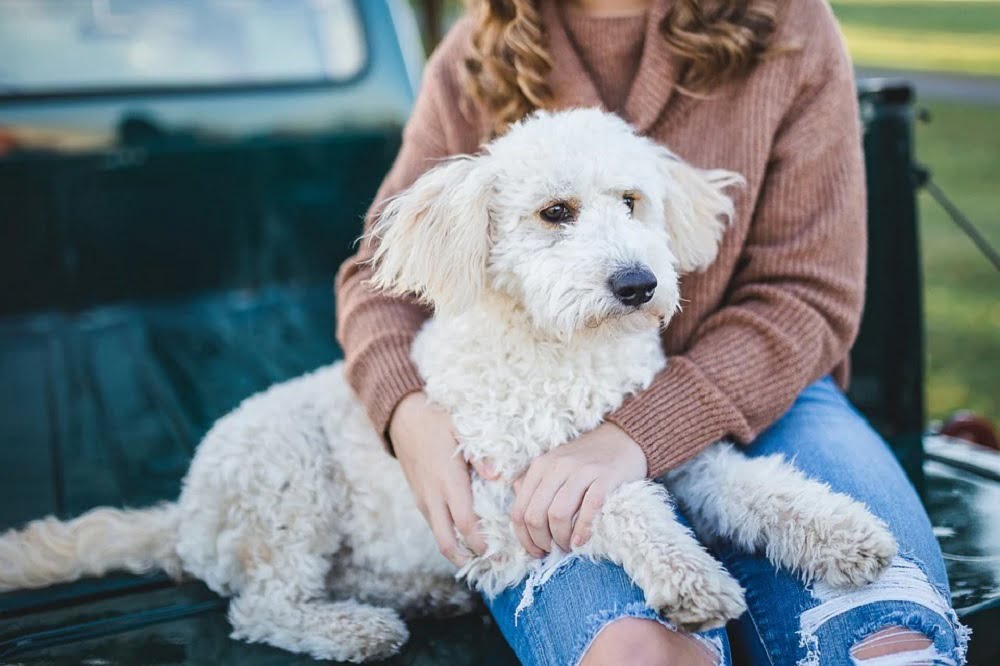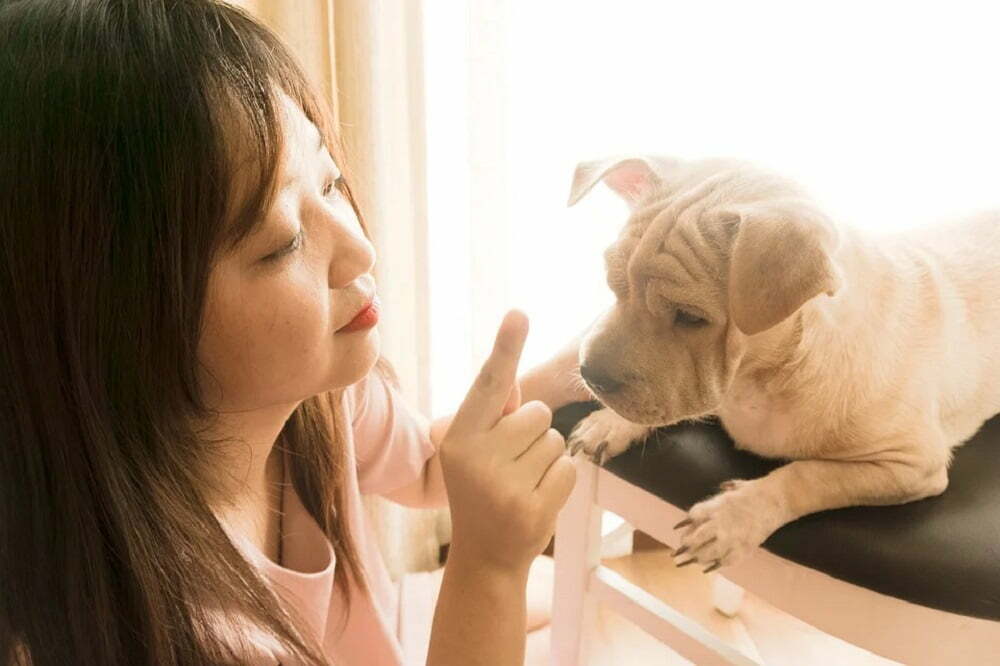When you’re walking around the house, you may notice that your dog follows one specific person around the house more than others. This can seem like rather odd behavior, but this is rather common in dogs.
Why does your dog follow you and not your husband? Well, there are a few reasons. For instance, it could be that your dog considers you to be the leader of the pack. Perhaps your dog has bonded more closely with you than he has with your husband, or they know that you’re more likely to give your dog rewards and treats. They may just prefer you for comfort, or they could simply be following you out of instinct.
It’s pretty nice to have your furry friend following you around, but it can sometimes be a little excessive, especially when they’re only following you and not your husband. After all, it would be nice to go to the bathroom every once in a while without having your dog staring you down!
Now, does your dog think that you’re the leader of the pack, or do you give him more treats? We have all of the answers about why your dog follows you and not your husband in this article!

Why Your dog Chooses One Particular Person to Follow
It can be a little confusing when your dog chooses only to follow one person. It can seem a little weird, especially since you both love your dog. Does it mean that your dog loves the other person any less?
Sometimes, a dog can become instantly more attached to one person rather than another person. It could even be because you were the first person to bring him home as a puppy – or an adult dog if you adopted.
We were also pretty curious about the answers to this. We’ve noticed in our personal lives that our dogs will always seem to follow one person more than another in our household. As such, we’ve done a little research into why dogs follow one person more than another. These are just a few of the reasons that we have found.
1. Imprinting
Picture this. You and your husband get a new dog. You both have a few weeks together, and then one of you needs to go away on business. If this happens, it means that one of you are going to be spending a lot more time with the puppy during his first couple of months with you than the other person is.
There’s research to suggest that animals can often imprint on the people that they are around the most during their first few months. Puppies can imprint not only on other dogs, but also on people! Dogs will usually begin to imprint when they are between three and 12 weeks old. As such, if you are the main person around your pooch during those first few weeks of life, then your dog is more likely to grow a closer bond with you than with your husband.
Imprinting is essentially where your dog makes bonds with other people. If you have spent those crucial first few weeks as the primary caregiver for your pet, they will come to regard you as their key source of safety and love. It doesn’t mean that they love your husband any less, it’s just that you’re their main person!
2. Separation Anxiety
As we’ve previously mentioned, dogs can grow incredibly close bonds with specific people. If you mainly work from home and you’re primarily around your dog, then there’s a chance that your dog will struggle to be away from you for even as much as a few minutes. They like to have you constantly in their sight because they are so used to having you around. As such, your dog may end up developing separation anxiety from you, so they insist on clinging to you more.
If your dog notices that you are about to leave the house, they may cry or bark in displeasure. If you are away from your dog and your husband is at home, your dog may also kick up a fuss. They may do things like urinating in the house when you’re gone because they are anxious to be away from you. They may also chew on doors and other things that they aren’t supposed to, they may try to escape or they may spend a lot of time pacing anxiously before you return home.
These are some key signs that your dog has separation anxiety. If your dog constantly feels the need to follow you around then this may also be a sign of separation anxiety. This can be a very concerning behavior, and your dog may end up hurting himself and ruining your furniture when you are gone. It’s a serious problem, and so if you are concerned you should speak to a pet behaviorist to help you to manage this issue. If the issue is managed correctly, your dog should be much calmer when they are away from you.
3. They Associate You With Positive Things
Your dog may also follow you more than your husband because they know that you are going to give them nice things. Perhaps you play with your dog or give him more love than your partner does. If you are the main one that feeds your dog then they may associate you with food and treats. Likewise, if they associate you with going on walks and other things that they enjoy, they are more likely to want to stay close to you.
Your dog knows that you’re the one that’s going to do things that will result in their happiness. As such, your dog may follow you around because they’re hoping that you’ll spoil them! You can make your dog more attached to your husband if they take part in these things too. For instance, you could both take turns feeding your dog, or you can take turns walking him. That way, your dog will be less likely to solely follow you everywhere.
4. It’s Their Personality
Certain dogs have a personality that dictates that they like to cling to certain household members. For instance, a Norfolk Terrier will likely adore children and people, and so they live the best when they are constantly around people. The breed has been bred through time to work with humans. Sometimes they are referred to as velcro dogs because it’s hard to pull them away from you.
This isn’t the only breed of velcro dog out there, however. Many of these so-called velcro dogs like to be as close as possible to their owners. As such, your dog will want to follow you around the house more than everyone else.
5. Friendship
This may seem a little too obvious, but your dog may want to follow you around just because they like your company. It’s a little like how a child may follow their mother or father around the house.
Dogs have been domesticated through time to ensure that they are close companions for their human counterparts. They bond with their humans, much like a parent and child. This bond is pretty strong, meaning that your dog likes to stay close to you.
6. You’re The Alpha
Dogs believe that other dogs lead their pack, so they follow them around. In the absence of another dog, your pet will assume that you are the alpha of your pack. You lead the pack, you’re in charge – your dog knows that. Your dog will then follow you around as a result of this. Perhaps they don’t view your husband as the pack leader, so they don’t feel the need to follow them around the house as much.
Now, it goes without saying that we love the company of our pets. With that being said though, it’s only natural that you would want to spend some alone time with your husband. There’s nothing like a dog staring you down to kill the mood. It may be a little weird for you to see your dog watching you like a hawk at all times.
Not only that, but your dog may want to share a bed with you. Putting him outside the room may be difficult, so what do you do? You don’t want your dog to disturb you when you are spending some quality time with your husband and during intimate moments.
7. They’re Being Hostile
If you’re in an abusive relationship, your dog may take to following the person being abused more often because they are trying to protect you. This is especially true if someone raises their voice at their partner.
Dogs will sometimes do it with new babies in the home too when they start to cry.
How Can A Clingy Dog Impact a Relationship?

Your dog has basically turned into your own furry stalker – it’s not always the best thing. It can be rather irritating too, especially if your dog has become obsessed with you. That constant need for attention can be pretty exhausting on you too.
Sure, it can be cute when your dog follows you everywhere. It can also be very irritating, especially when there are certain moments when you don’t want your dog to be right next to you.
How Can I Stop The Behavior?
Usually it’s best to curb possessive behavior at a young age. Unfortunately, this sort of behavior doesn’t always show up when your dog is a puppy. This means that it’s a lot harder to stop it from happening. Reprimanding your dog may not be particularly helpful when they are older, either.
So, what can you do? The best thing to do is to ensure that your dog’s bond doesn’t solely lie with you. Make sure that your dog also spends plenty of time with your husband and any other members of your household. Perhaps any children can take turns feeding your dog, or your husband could take him for walks instead of you. It’s also a good idea to take steps to ensure that your dog is okay with being on his own too. Get him used to staying in one spot when you leave, such as his bed.
Eventually, your dog will become attached to other household members with a little bit of training.
Conclusion
It’s always a good idea to take steps to get your dog to follow more than one person around the house. An independent dog with plenty of bonds in the home is a happy dog, after all. With time, your dog will be following your husband just as much as he’s following you!
